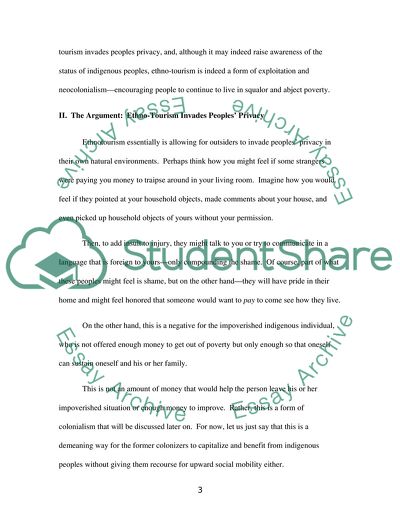Cite this document
(Ethno-Tourism: Demeaning or Disadvantageous Essay - 2, n.d.)
Ethno-Tourism: Demeaning or Disadvantageous Essay - 2. https://studentshare.org/tourism/1755102-although-in-the-short-term-ethno-tourism-can-be-beneficial-in-the-long-term-the-negative-consequences-far-outweigh-any-advantages-using-existing-literature-and-data-evaluate-this-claim-from-the-perspective-of-visitors-and-tribal-communities
Ethno-Tourism: Demeaning or Disadvantageous Essay - 2. https://studentshare.org/tourism/1755102-although-in-the-short-term-ethno-tourism-can-be-beneficial-in-the-long-term-the-negative-consequences-far-outweigh-any-advantages-using-existing-literature-and-data-evaluate-this-claim-from-the-perspective-of-visitors-and-tribal-communities
(Ethno-Tourism: Demeaning or Disadvantageous Essay - 2)
Ethno-Tourism: Demeaning or Disadvantageous Essay - 2. https://studentshare.org/tourism/1755102-although-in-the-short-term-ethno-tourism-can-be-beneficial-in-the-long-term-the-negative-consequences-far-outweigh-any-advantages-using-existing-literature-and-data-evaluate-this-claim-from-the-perspective-of-visitors-and-tribal-communities.
Ethno-Tourism: Demeaning or Disadvantageous Essay - 2. https://studentshare.org/tourism/1755102-although-in-the-short-term-ethno-tourism-can-be-beneficial-in-the-long-term-the-negative-consequences-far-outweigh-any-advantages-using-existing-literature-and-data-evaluate-this-claim-from-the-perspective-of-visitors-and-tribal-communities.
“Ethno-Tourism: Demeaning or Disadvantageous Essay - 2”. https://studentshare.org/tourism/1755102-although-in-the-short-term-ethno-tourism-can-be-beneficial-in-the-long-term-the-negative-consequences-far-outweigh-any-advantages-using-existing-literature-and-data-evaluate-this-claim-from-the-perspective-of-visitors-and-tribal-communities.


